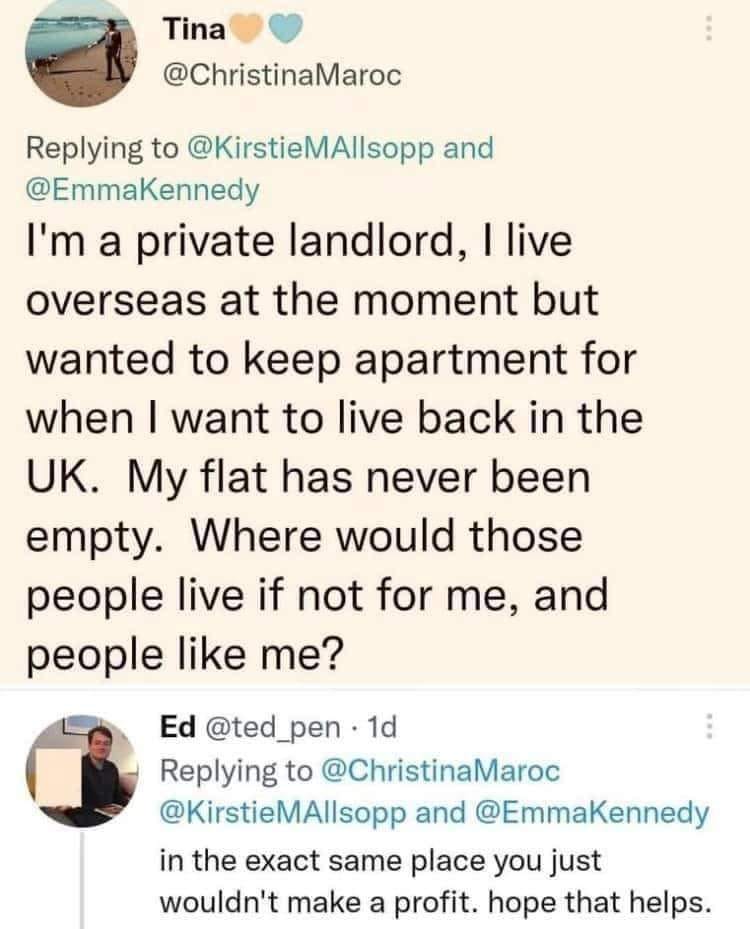this post was submitted on 19 Mar 2024
1553 points (96.4% liked)
Political Memes
5446 readers
3235 users here now
Welcome to politcal memes!
These are our rules:
Be civil
Jokes are okay, but don’t intentionally harass or disturb any member of our community. Sexism, racism and bigotry are not allowed. Good faith argumentation only. No posts discouraging people to vote or shaming people for voting.
No misinformation
Don’t post any intentional misinformation. When asked by mods, provide sources for any claims you make.
Posts should be memes
Random pictures do not qualify as memes. Relevance to politics is required.
No bots, spam or self-promotion
Follow instance rules, ask for your bot to be allowed on this community.
founded 1 year ago
MODERATORS
you are viewing a single comment's thread
view the rest of the comments
view the rest of the comments

Yeah, the whole "what about people who want / need to rent because of their current circumstances" problem really is easy to solve.
Create a crown corporation (for those not familiar, a not-for-profit entity owned at arms length by the government) to handle all rentals, with a mandate to offer rents at a (very low) rate established by a formula that accounts for factors of property value (footage, amenities, location), population density and rental demand in a given area.
Then you make it so that only this crown corp is allowed to charge residential tenants rent. Anyone else who wants to make money off of their second properties and the like will have to sell them to the crown corp. Anyone like in the OP who wants to rent for some months of the year will enter an arrangement with the crown corp where the corp rents the property on their behalf at the rates established by the formula.
Municipalities having their own rental apartments is very common where I live. Though here it works in tandem with private sector.
Yes, same here - they are needed in times of turmoil and crisis ... in this case the "crisis" being landlords hiking rents.
So in recent years municipalities (and some EU countries) are investing increasingly more into such non-profit projects. It works, rents are low, communities live. Even if buying land and developing got costlier.
Even if this would cost taxpayers money (ie operating with financial loss), I gladly pay it, it benefits us all.
The tandem option is also viable, and is actually a really great starting place for this sort of thing (I will fully acknowledge that my proposal would be very difficult to get through any current political system). The public sector deliberately competing with the private to bring down prices has been proven to work. A great example of this is Sasktel in Canada, where the provincial government made their own publicly owned telecoms provider, and as a result all the big telcos, that functioned as an oligopoly everywhere else, offering identical plans at identical prices, had to offer plans that were much, much cheaper in Saskatchewan specifically.
Also there's absolutely room for debate as to whether a single massive rental company would be better, or whether it would be preferable to have lots of small, regional or municipal corps. I prefer the former only because it would give them more flexible buying power in terms of scooping up properties to rent out, but I'm sure there are strong arguments for the other approach.
Indeed, yes. There are actually a lot of such cases in EU (state sponsors directly or indirectly housing projects a few 100 units at a time), even if it's "just" a case of better priced (still market priced, but not that extremely "for profit" driven) offerings, people either get to buy or at least to live in contemporary housing of some stature/location (bcs commute is a killer in every non-economical sense). This builds local communities, art, places to live/visit/enjoy, and facilitates families/family needs.
It also helps to stabilize the market & gives a chance for normal people to (somewhat) catch-up up to the market they helped to built/their labor built.